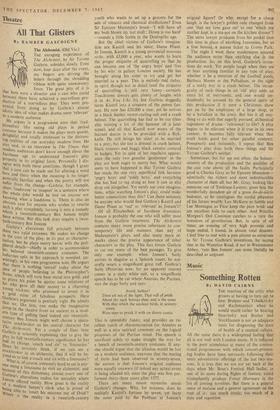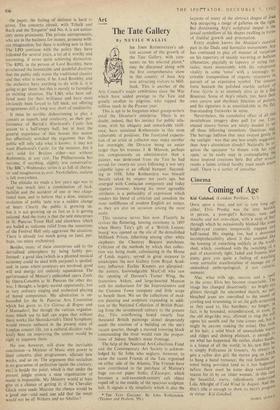Music
Something Rotten
By DAVID CAIRNS
THE reaction of the critic who groans at having to turn out to hear Brahms and Tchaikovsky and Rachmaninov when he would much rather be hearing Stravinsky and Boulez and Stockhausen is not an adequate basis for diagnosing the state of health of a musical culture. All the same there is a widespread feeling that all is not well with London music. It is reflected in the poor attendance at many of the conven- tional programmes with which concert-promot- ing bodies have been nervously following their more adventurous offerings of the last two sea- sons. It is true that we are not yet back at the days when Mr. Bean's Festival Hall leaflet, in one of its more daring flights of fantasy, could triumphantly produce Forest Murmurs in the list of coming novelties. But there is a general sense of malaise and a general agreement on the root of it: too much music, too much of it stale and repetitive. On paper, the feeling of dullness is hard to prove. The concerto circuit, with Tchaik and Rach and the 'Emperor' and No. 4, is not notice- ably more prominent. The private entrepreneurs, who are in the business for money, promote with- out imagination, but there is nothing new in that. The LPO continue with the policy they have followed for several years, a lot of it worthy and interesting, if never quite achieving distinction. The RPO, in the person of Lord Boothby, have proclaimed the lamentable and doubtful doctrine that the public only wants the traditional classics and that what is more. if he. Lord Boothby, and the orchestra have anything to do with it, it is going to get them: but this is merely to formalise an existing situation. The LSO, who have suf- fered most for their brilliance and have most obviously been forced to fall back, are offering programmes still a long way short of mediocrity.
It must be terribly disheartening to play a concert as superb, and revelatory, as their per- formance of Bartok's Bluebeard's Castle last season to a half-empty hall: but at least the general experience of thin houses this season has effectively scotched the argument that the public will only take what it knows: it may not want Bluebeard's Castle, for the moment, but it isn't solid for Brahms either—not without Rubinstein, at any rate. The Philharmonia has become, if anything, slightly less conservative. The BBC's Wednesday series is as full of charac- ter and imagination as ever. Nevertheless, malaise is felt everywhere.
The mistake we made a few years ago was to read too much into a combination of luck, fashion and the accident of one or two excep- tional men, and to believe that a slow, tentative evolution of public taste was a sudden change of heart. Clearly the public is growing up. but it is not growing up as fast as it is getting satiated. And the irony is that the new enterprises in St. Pancras Town Hall and elsewhere which are hailed as welcome relief from the monotony of the Festival Hall only aggravate the situation. There is already too much going on (and, per- haps, too many orchestras).
Besides, many of these enterprises add to the devitalised atmosphere by being feebly per- formed: a good idea (which in a planned musical economy could be used with purpose) is spoiled: and, in cases where amateurs are involved, good will and energy are uselessly squandered. The performance of Mozart's unfinished opera Zaide by Opera-Concerts at St. Pancras the other day was, I thought, a largely wasted opportunity, lost in very ordinary singing and orchestral playing of bored competence. My admiration is un- bounded for the St. Pancras Arts Committee which has given us Un Giorno di Regizo and I Masnadieri; but though the various organisa- tions which use its hall can argue that without them works like Shostakovich's Third Symphony would remain unheard in the present state of London concert life, yet a cultural dictator ruth- lessly bent on improving the system would be right to suppress them.
No one, however, will draw the inevitable conclusion—a Minister of Music with power to limit concerts, plan programmes, allocate new works, and so on. The argument that socialism is no guarantee of perfection (quite the contrary, etc.) is beside the point, which is that under the present jungle system a sane organisation of music is impossible. My Ministry would at least give us a chance of getting it; if the Chevalier Clock were made Minister the chance would be a good one—and need one add that the result would not be all Webern and no Sibelius?







































 Previous page
Previous page